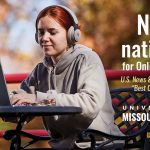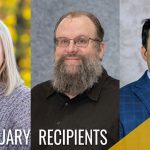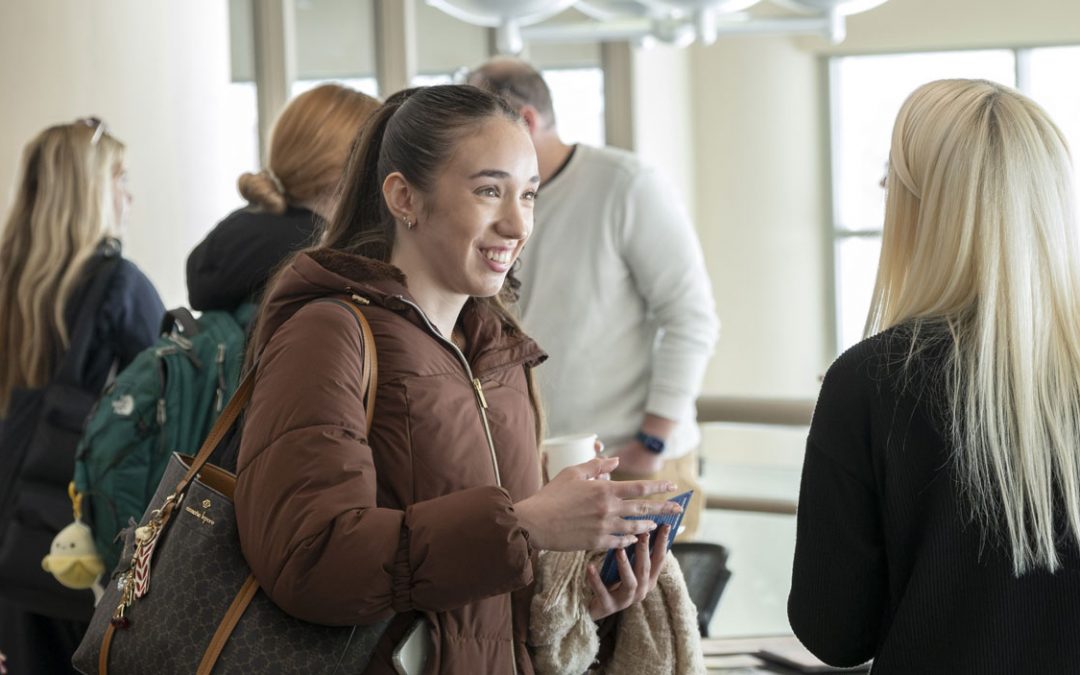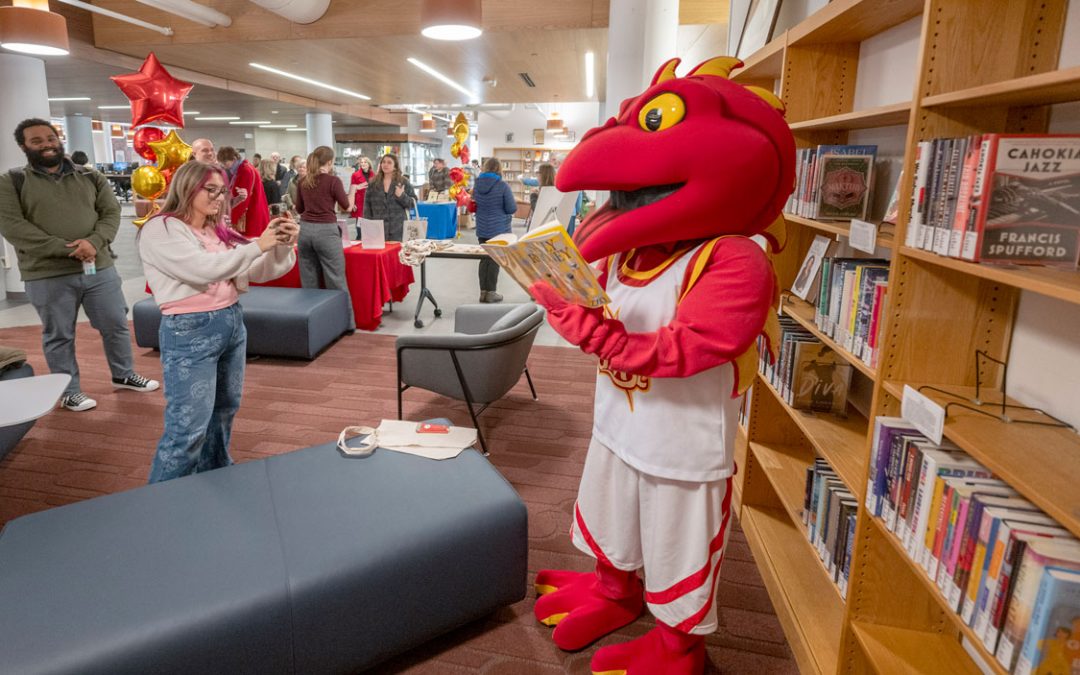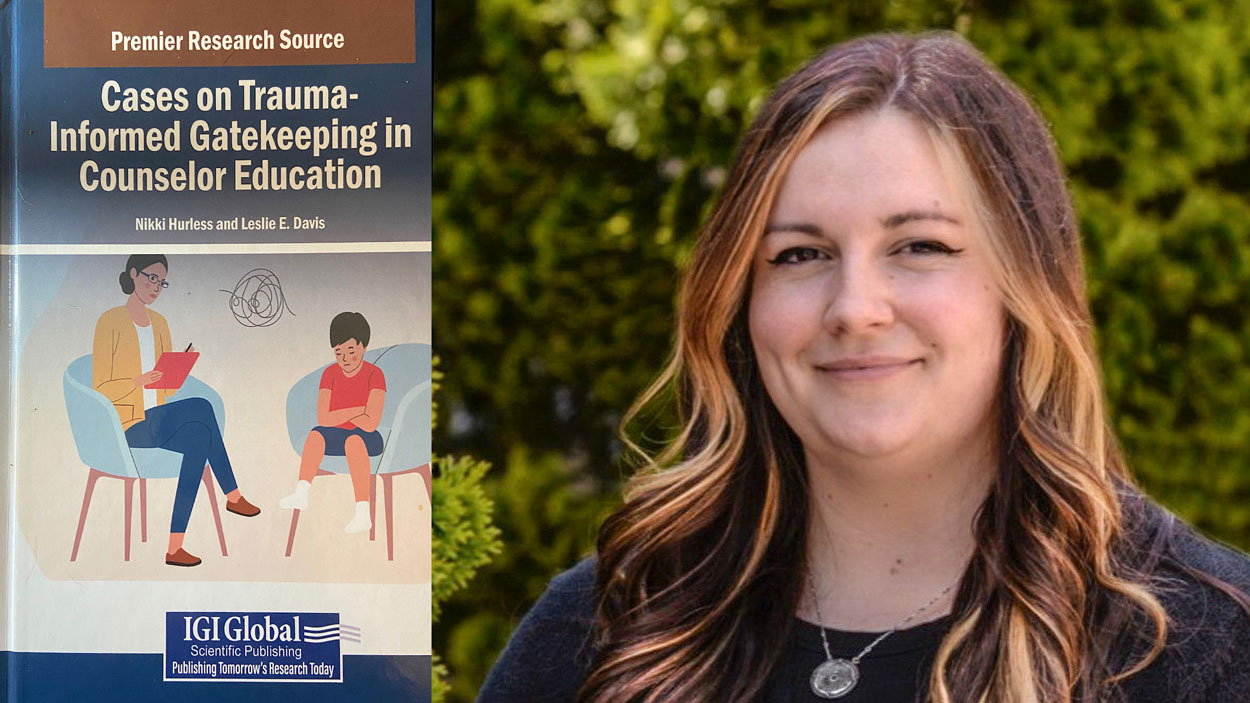
Leslie Davis co-edited “Cases on Trauma-Informed Gatekeeping in Counselor Education” with UMSL alum Nikki Hurless. The book aims to provide a roadmap for supervisors when confronted with students who are not ready to work in the field. It’s also the topic of Davis’ PhD dissertation at UMSL. (Photo by Derik Holtmann, cover image courtesy of Leslie Davis)
Gatekeeping – the process of controlling or limiting access to something – is usually thought of as negative, particularly when it’s used to keep certain people out of decision-making processes or positions of power.
However, in educating future counselors, sometimes it’s necessary. Counselor educators and supervisors are required to gatekeep students who are not prepared to work in the field in a competent or ethical manner. Practically, this means either working with students to address their professional disposition or biases before they move on in a counseling program or, in some cases, expelling them from the program.
Leslie Davis, a professionally licensed counselor pursuing her PhD at the University of Missouri–St. Louis, became increasingly interested in that process after nearly a decade in the field. Davis uses a trauma-informed approach in her practice, recognizing patients’ past traumatization and how it affects behavior long-term. She began investigating whether this lens was being applied to counseling students themselves.
“I thought, ‘OK, well, what trauma-informed gatekeeping models exist?’” Davis said. “Well, they don’t. They’re not designed to look at this whole person and the possible trauma that they’re bringing into the classroom, or how that might show up with clients.”
Having found a significant gap in practice and research, Davis decided to tackle the issue herself. She co-edited a book on the topic with UMSL alum Nikki Hurless titled, “Cases on Trauma-Informed Gatekeeping in Counselor Education,” and explored the topic in her dissertation, which she’ll defend on April 9.
The issue of gatekeeping in counselor education is delicate and nuanced. Davis said many students excel with early coursework and application of theory. However, underlying issues may not become apparent until the students begin working in the field. Supervisors might then identify serious concerns such as a lack of empathy with certain clients.
At that point, the supervisors will work with students to address the issue, but there’s often an incentive to just push them through to graduation even if it hasn’t been resolved. That creates a domino effect, or as Davis describes it a “spider-web effect.”
“It’s this wheel,” she said. “We’re not gatekeeping well, and we’re not producing counselors who are ready, which then creates supervisors who aren’t ready. Then we’re into this kind of loop of creating some unethical practices.”
Davis’ book aims to provide a roadmap for supervisors when confronted with these difficult situations. Each chapter is centered around a case study with techniques to utilize. She added that the foundation for dealing with these issues is creating a safe environment in the classroom, where both students and educators can be honest with each other and challenge each other respectfully.
For instance, if a student is having a power struggle with an abusive boss outside of school, that might lead to disruptive behavior in the classroom where the student is faced with another authority figure. It’s up to educators to get to the root of that behavior.
“If I see you’re struggling with this particular client or this fellow classmate, or there seems to be something happening between you and me as the professor, can we have a discussion about what’s happening?” Davis said.
Davis never imagined she would pursue a doctorate or co-edit a book growing up in Brighton, Illinois, a rural village where it wasn’t unusual for students to drive tractors to school during the harvest seasons. Yet, she developed an interest in psychology during high school.
“Growing up in a small town – it took five towns to create our high school that was literally surrounded by corn fields – it was understood that you would go into agriculture or something like that,” she said.
A softball scholarship initially took Davis to UMSL, where she cultivated her interest in psychology. Her experience in the Department of Psychological Sciences as an undergraduate was as positive as it was eye-opening.
“I loved it,” Davis said. “It’s something I still think about to this day. It informed so much of what I still try to teach or supervise or explain to people. I still remember Dr. (Jennifer) Siciliani being one of the raddest professors I’ve ever had. She’d walk in with her red lipstick and stiletto heels, and we’d learn about some psychopharmacology.”
The program also prepared her for the next steps in her academic career. Davis said UMSL’s faculty members were very honest about the need for a master’s degree to continue on to a career in psychology or a related field.
As her time as an undergraduate was coming to an end, she met a sports counselor at Lindenwood University, and he convinced her to enroll in the school’s professional counseling master’s program. At first, Davis was a bit unsure because she wasn’t particularly familiar with counseling. However, she took to it immediately.
“It was this whole new world of understanding people and not just getting to study them, but really understanding them and being with them, which was much more powerful,” she said.
After briefly practicing sex therapy and working in emergency rooms assessing patients in crisis, Davis landed a position with Bridgeway Behavioral Health, an intensive outpatient facility specializing in substance use disorder.
After a little while, Davis transferred to a different facility within the same organization, but she kept seeing the same thing. Across the board, patients were all traumatized, often in more than one way, before drug use. However, trauma-informed care wasn’t being used in many cases. Davis campaigned to make it more of a focus at the facility and became trained in EMDR, or eye movement desensitization and reprocessing. The structured form of therapy uses a flashing light bar while focusing on a specific memory to reprocess traumatic events.
Davis started developing a trauma-informed training program to educate other counselors when she realized that it was not feasible to treat every patient at facility. While getting coffee with Jessica Brao, a former professor from her master’s program, Davis told Brao she wanted to do more and make change.
“There’s so much more I felt like I could do for the field,” she said. “I love being a counselor, but I hadn’t even been in the field that long, and I’m seeing all these really big gaps in knowledge and the supervisor experience. At one point, I think I was teaching my supervisor about EMDR, because he had no specialization in trauma.”
Brao encouraged her ambitions and told her she needed to apply to the counseling doctorate program in the College of Education at UMSL. She followed that advice and returned to her alma mater in 2018.
The doctoral program has been an empowering experience for Davis. Throughout the dissertation process, Associate Professor Phillip Waalkes has guided Davis and instilled confidence in her as an advocate and researcher.
“I would say it’s totally shaped how I work at this point,” Davis said. “Throughout my career, looking back, I noticed I was advocating. I was trying to do that through education and trying to help with supervision and consultation. But it wasn’t until UMSL that I understood I care about advocacy. It actually gave me direction and context to what I was trying to do.”
Davis said it’s exciting to be on the verge of graduating, especially after co-editing a book in addition to writing a dissertation. She hopes to continue working with clients and counseling students but also to keep conducting research.
“I feel like I’m not just someone out there with some opinions,” she said. “I feel like I’ve put in a lot of time trying to understand these topics and really see the gaps in our field, research wise, clinical practice wise, community mental health wise, and I just want to keep making things better.”










